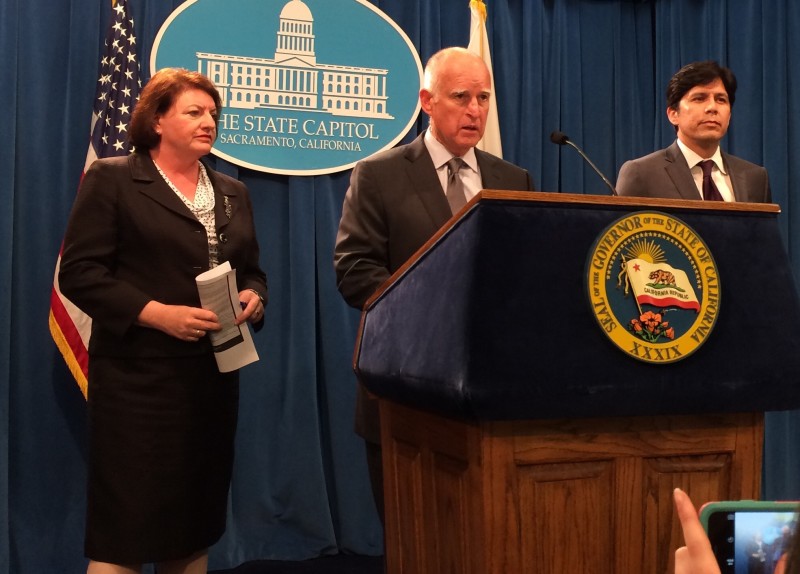Under the brokered deal, the state will expand access to preschool and child care services by 13,800 slots. That’s more than Brown had endorsed in his revised budget in May (and financed from a number of pots of money, including some out of the K-14 education funding guarantee); but it’s smaller than the 27,000 slots legislative Democrats had demanded in their own spending plan.
And it offers $40 million for a high-profile effort to allow all children, regardless of their immigration status, health care coverage under the Medi-Cal plan. Legislative Democrats had wanted the coverage to kick in early in 2016; the compromise allows undocumented children into the system on May 1 of next year.
The deal also expands funding for the California State University and University of California systems beyond the governor's May budget -- $59 million more for CSU, $25 million more for UC -- but that money comes with strings attached, especially for UC officials who would have to add 5,000 in-state students by the summer of 2017 to get the cash.
Other highlights of the deal between the governor and legislative leaders include:
- $226 million to restore a cut made several years ago to In-Home Supportive Services funding, but only for the 2016-17 budget year
- A $500 million block grant to focus on teacher effectiveness, paid for out of the state's K-14 education funding guarantee
- A new state earned income tax credit to help the working poor, at a cost of $380 million
But there was much more, it seemed, that the governor was unwilling to give legislative Democrats and to advocacy groups who wanted expanded social services. Perhaps most notable was a boost in funding for the developmental disability programs and a boost in monthly cash stipends for the aged, blind and disabled.
Also missing: additional money for families in the welfare assistance program, CalWORKs -- including a legislative proposal to end the maximum family grant cap for families that have more children while receiving assistance.
"We have more work to do," said Assembly Speaker Toni Atkins (D-San Diego) in her remarks at the news conference with the governor and Senate President pro Tem Kevin de León (D-Los Angeles). "We didn't get everything we wanted accomplished in this budget, and so we'll redouble our efforts."
Special Legislative Sessions On Roads, Health Care
Those efforts will now turn to special legislative sessions being called by the governor to address state infrastructure needs and to craft long-term funding for health care services. Moving those items to a special session -- and out of the budget -- not only buys more time for negotiations, but also could put some political pressure on legislative Republicans. A number of GOP legislators expressed support for both policy needs during the budget debates this year, but would now be asked to approve new revenues to fund them.
Governor Wins Tax Estimate Fight ... Again
For Brown, the deal marks another milestone in his quest for state budget stability -- stability brought on by a fascinating combination of an improving economy, new budget crafting rules approved by voters over the past few years, and the governor’s unique ability to control the master political narrative in Sacramento.
It was, after all, Brown who vetoed the budget in his first go round on returning to the governor’s office in 2011. Since then, he has won pretty much every budget fight, none more important than the debate over tax revenue projections.
The new budget agreement again relies on the estimates crafted by the governor’s fiscal advisers, an estimate that’s approximately $2.2 billion smaller in size than the one favored by the Legislature. As such, the negotiated deal is less ambitious than the spending plan approved less than 24 hours earlier.
"If we start fiddling" with the system of predicting revenues, said Brown in the budget deal news conference, "we get subjective, political, and I'm not prepared to do that."
Brown’s continued success in shrinking revenue expectations has meant fewer resources for social services and other non-mandated expenses. It’s also allowed the governor to limit the use of “surplus” dollars each time that his predictions have been surpassed. Had Brown agreed, both this time and in previous years, to cementing the higher revenue estimates in the annual budget act, more of the money would have been funneled into ongoing commitments.
"Given the yo-yo quality of our finances," said the governor, "I think the steady consistency [of the Brown administration's economists] is a good idea."

